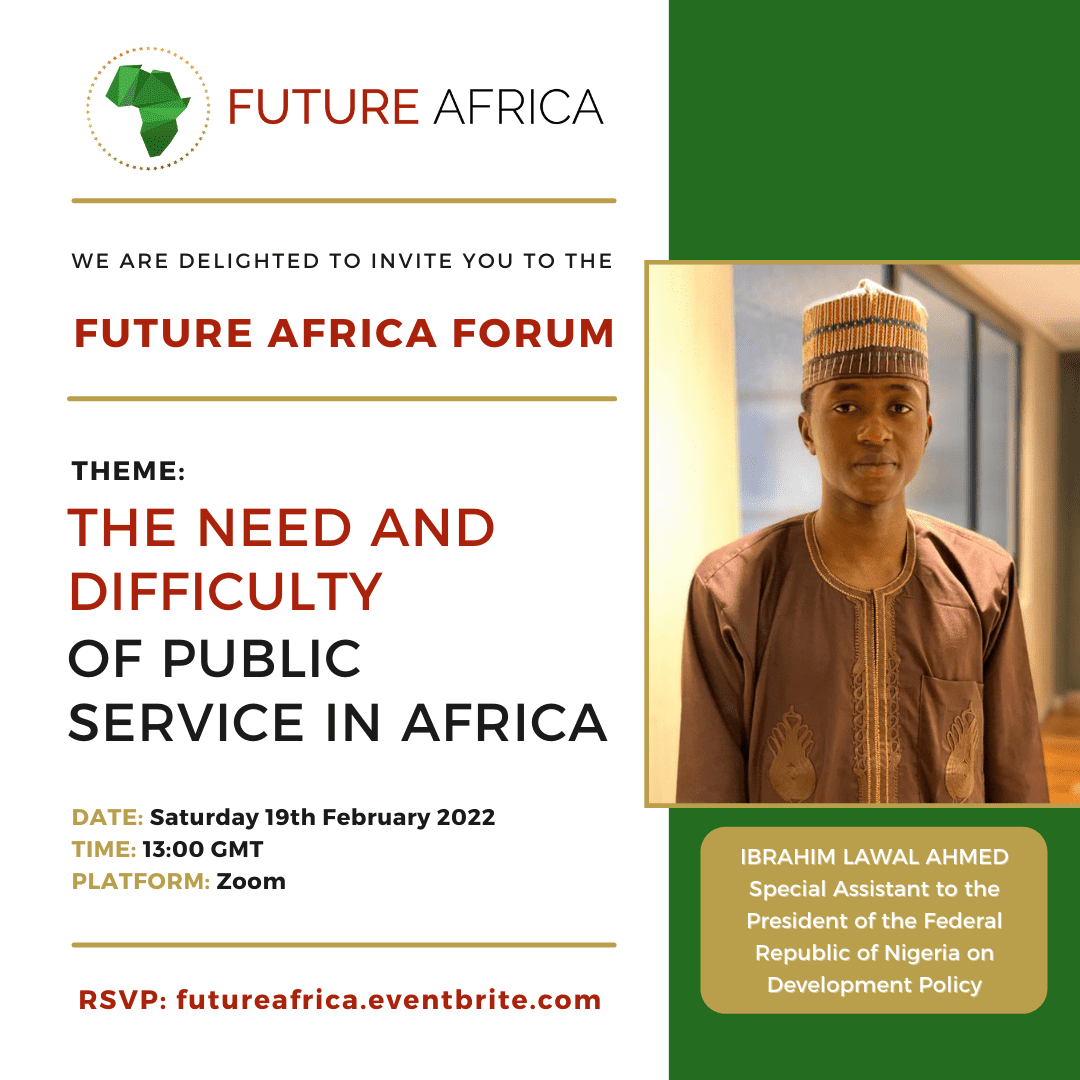Government is a trust on behalf of the govern – John Locke
INTRODUCTION
Many people do not have a full grasp about what public service, in the generic sense of the word, connotes. Public service is not just about working for and in the government. It is essentially about what that service is geared toward achieving. In this regard, it is important to know that public service is an organization whose primary objective is improving the welfare of the citizenry. Public service is the logic of government and governance. This is why public service is regarded as synonymous with government itself.
Regardless of the differences among the proponents of the social theory of state, one thing that is common is that, the machinery of the state (government) is expected to provide certain services to the people such as securing their lives and properties. The idea is that government is a manager of conflict; an institution that checks human excesses and works to ensure that resources are channeled towards providing the greatest benefits to the greatest number. Since in most cases the majority of the people in any country are the poor or belong to the lower class, government, therefore, aims at basically providing security (freedom from want and need) to those people. And this is what ideally public service is all about.
It is this very idea that inform the recurrent stand by any politician seeking elective political office as the defender of the poor masses or the one who pushed for the interest of the poor masses. It is also this very idea that inform the demands by the populace to the government; or rather blaming the government for any inconvenience one finds him/herself in.
Public service can broadly be categorized into three: One, carrier public service which is working in a Ministry, Department or Agency of government. Two, political appointment such as Secretary to the Government, Ministers, National Security Adviser and Special Advisers. Three, elective offices such as President, Governors, National and House of Assembly. It is like a pyramid. At the bottom is the carrier public servants who are mainly concerned with the execution of policies; at the middle are the political appointees who could be technocrats that are mainly concerned with the formulation of policies and supervision of policy implementation. And at the top are the elective officers who are usually politicians that consider, review and approve/decline policies push to them by the technocrats. This talk is essentially from the technocratic and political view point of public service, and the term public is use, subsequently, to simply refer to African public.
THE NEED FOR PUBLIC SERVICE IN AFRICA
Before I go further, I want you to know that this discourse is inform by my current experience in the high level of policy making in the Federal Government of Nigeria while serving as Special Assistant to the President on Development. While I am fully aware of the nuances in the nature of public service in other African countries, I staunchly believe that Nigeria embodies all that you may need to know about Africa, particularly, if the issue of concern relate to Sub-Sahara region. In other word, Nigeria is a good case study about what is Africa, the challenges and the successes that the continent is grappling with in its bid to attainment of modernity.
Africa has been facing hydra-headed challenges that cut across violent conflicts across religious and ethnic lines as well as the manifestation of poverty in all of its multidimensional ramification. Therefore, each problem is massive and requires lot of efforts and huge resources to address. And no single problem can be fully addressed without addressing the others. For example, ethnic conflicts cannot be addressed without addressing poverty and inequality. And inequality and poverty cannot be addressed without peace. The question is, who has the resources and the authority to influence and catalyse such radical change and leap forward? The answer is simple, government.
Government is the only institution, in any polity, that has the authority, thereby giving it the capacity and resources to intervene massively toward influencing the lives of millions of people with the aim of uplifting them from their sufferings. This can be done through provision of social services which serve to meet the needs of the people. It is significant to appreciate the importance of social services in Africa. Social services do not only facilitate decent living, but also, particularly those that come to be define as public goods, serve as a bond that hold peoples together as citizens. It also helps to check the gap between the poor and the rich. Therefore, public servant’s actions directly affect the lives of the people. This means that his/her competence matters a lot in the affairs of the state.
Government is a space of competing interests between and among all sorts of groups (ethnic, sub-ethnic, religious, sub-religious, regional, sub-regional etc) and classes (commercial, industrial, agricultural, workers etc). Policies are informed by lobbies from these groups, each trying to influence government’s actions to be favourable to them. The work of a public servant, in both the policy making and execution, is to balance these interests on utilitarian basis of providing the greatest benefits (happiness) to the greatest number.
THE DIFFICULTY OF PUBLIC SERVICE IN AFRICA
Public service is not an easy job. Managing African public is a complex task that involves a lot of personal skills as well as familiarity with constitutional and bureaucratic procedures. Indeed, it comes with lot of priviledges such as official car, official residence, recognition and respect both nationally and internationally. However, what most people fail to realise is that those privileges are not given in vain; with priviledges come responsibilities. The priviledges are given so that the public servant can focus on his/her job.
The fundamental challenge of public service is not essentially about finding solution(s) to societal problem but it is rather an agency problem. In other words, the major challenges that a public servant will face are from: (a) the public; (b) the individuals that make up the public service and; (c) Groups pushing for their interests. One must know that politics drives policy, but it is personality that drives politics. Policy making is more about the personalities of the actors involved than the content of the policy. It always involve a serious clash of interest among the public servants which is often a product of the influence of competing groups of elites. On the face of failing to influence policy in its favour, a group may sabotage the whole policy or sponsor a publicity against that policy using erudite and respected national figures. Therefore, what is professional is always personal
The public always want change and they want it now. The public often do not care how you make their lives better as long as it does not affect their comfort or ease. The public most often are misinformed and analyse issues on its face values and has a low level of trust on governmental officials. This results in misunderstanding of good policies and being victims of supporting bad policies.
Because most of public service work are confidential, the public does not know the reality of the government; that is, the capacity of the government to tackle problem or change their lives. Like it is stated in economics, human needs are unlimited and the things to satisfy them are limited, public service involves managing limited resources of the public for public interest. That is why each group competes to influence policies that will make them benefit from those limited resources. The reason for the confidentiality of public service’s work, among others, is because ignorance and impression are instrument of power. If you do not know the true nature of something, first, you will fear it; and second, you take it as it appears to you. The power of African governments lay in good impressions and, from time to time, show casing their capacity to unleash violence by using a scape goat. This is necessary as there is still a delink between the state and the society in Africa.
Competition among groups over government’s policies and programs makes public service to involve a lot of lobbying and sycophancy. In fact, sycophancy is arguably the biggest industry in Africa. Another word for lobbying and sycophancy is rentierism. Individuals desperately competes for contracts, licences and employment in lucrative position for their personal material benefits. This fuels almost the biggest problem of public service in Africa, corruption.
It is difficult to define corruption in African sense because it is essentially a moral issue not a legal issue. Moreover, what in the western sense is deemed corruption is not necessarily like that In Africa. For example, it is African culture to respond to kind gesture with courtesy. This could be in small gifts. In addition, it is African culture for the community to make tremendous sacrifices and put together lot of goodwill for one’s success. However, one is expected to return that favours by contributing to the development of the community at the time of his/her success.
This means that one is expected to favour his/her own community when he/she gets into the public service. It is important to know that Africans deem public service as an amoral space where the basic aim is to accumulate wealth. This is the reason what may not be morally accepted in the cultural spaces is deem acceptable in civic spaces. Any developmental theory on Africa must address the question of ‘how Africa can develop with corruption and indebtedness?’
From the above, you can deduce that leadership, which is what public service is all about, is not easy. Let me correct an impression, leadership is not a one man business; for one man can inspire social change but cannot bring social change. Leadership is a collective responsibility requiring everyone at each level of authority and social status to perform his/her responsibilities well. Leadership of a public institution involves balancing interests and being careful not to offend many people, and not to deviate from the bureaucratic procedures. It can be lonely at the top. Policies done with the best intentions will turn out to be sabotaged or worsen the situation. People that you trust will disappoint you. People that appear to be competent will turn out to be charlatans. Family and friends will turn you into a cash cow. But one should never lose the sight of what is right and should have the courage to always do what is right. You should take responsibility for your actions and be ready to face the consequences. In the end, the greatest peace is that of the mind.
LESSONS LEARNT
Personally, I am learning a lot of things as a public servant. The following are some of the lessons I learnt:
- You must be able to learn and learn fast.
- You must be able to think critically, read voluminously, write persuasively and speak eloquently.
- You must be firm and have a conviction. This will make you to be able to hold on to your moral and ethical values in face of enticement.
- You must be ready fight to protect your position because sometimes survival is the most important thing in corporate politics.
- You should learn to be stubborn in pursuit of a goal and flexible in your approach to the goal.
- You should be rich in patience, courageous and open-minded.
- For me, the greatest lesson I learn is, I still have a lot to learn.
From the above lessons, you will see the permutation or dialectics between professional and personal life of a public servant. As I stated above, though in different context, what is professional is personal. The qualities of a good public servant are not different from the values that defines a good man and good life. So, it fundamentally boils down to being good person. But it is not easy to be good. In fact, the differences between good and evil is quite blur and hazy. Indeed, Aristotle is right, “life is a gift of nature, but good living is a gift of wisdom.”
CONCLUSION
In a final note, I thank the officials of Future Africa, first, for this opportunity to share with my friends across the continent and in diaspora my perspective base on what I am experiencing in the public service of Nigeria. Second, for initiating Future Africa itself and creating this kind of avenue where public figures interact and exchange ideas with the cohort who are largely young individuals.
It has been the believe that African development depends upon collective progress of all its peoples. There is a strong interconnectivity and interrelation among Africans which dates back to the ancient times. At this digital era, this interconnectivity and interrelation is made easy and efficient. The challenge is how to shape our relationship toward collective development and shared prosperity. And this is what I see Future
Africa stand for by providing a platform for social network among the young generation across the continent; a cohesion of like-minded.
In the end, it remains as Frantz Fanon said “every generation must out of relative obscurity discover its mission, fulfill it or betray it.”
Being the talk presented at the Future Africa Forum on 19th February 2022.




